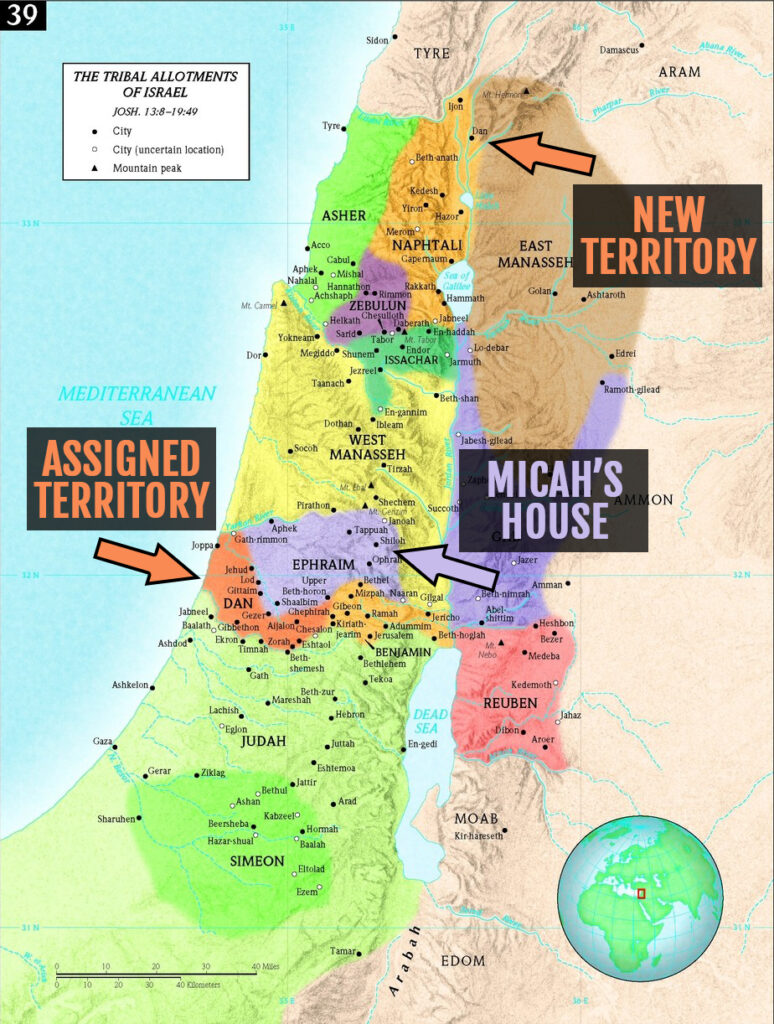Danites Take the Levite and the Idol
18 In those days there was no king in Israel. And in those days the tribe of the people of Dan was seeking for itself an inheritance to dwell in, for until then no inheritance among the tribes of Israel had fallen to them. So the people of Dan sent five able men from the whole number of their tribe, from Zorah and from Eshtaol, to spy out the land and to explore it. And they said to them, “Go and explore the land.” And they came to the hill country of Ephraim, to the house of Micah, and lodged there. When they were by the house of Micah, they recognized the voice of the young Levite. And they turned aside and said to him, “Who brought you here? What are you doing in this place? What is your business here?” And he said to them, “This is how Micah dealt with me: he has hired me, and I have become his priest.” And they said to him, “Inquire of God, please, that we may know whether the journey on which we are setting out will succeed.” And the priest said to them, “Go in peace. The journey on which you go is under the eye of the LORD.”
Then the five men departed and came to Laish and saw the people who were there, how they lived in security, after the manner of the Sidonians, quiet and unsuspecting, lacking nothing that is in the earth and possessing wealth, and how they were far from the Sidonians and had no dealings with anyone. And when they came to their brothers at Zorah and Eshtaol, their brothers said to them, “What do you report?” They said, “Arise, and let us go up against them, for we have seen the land, and behold, it is very good. And will you do nothing? Do not be slow to go, to enter in and possess the land. As soon as you go, you will come to an unsuspecting people. The land is spacious, for God has given it into your hands, a place where there is no lack of anything that is in the earth.”
So 600 men of the tribe of Dan, armed with weapons of war, set out from Zorah and Eshtaol, and went up and encamped at Kiriath-jearim in Judah. On this account that place is called Mahaneh-dan to this day; behold, it is west of Kiriath-jearim. And they passed on from there to the hill country of Ephraim, and came to the house of Micah.
Then the five men who had gone to scout out the country of Laish said to their brothers, “Do you know that in these houses there are an ephod, household gods, a carved image, and a metal image? Now therefore consider what you will do.” And they turned aside there and came to the house of the young Levite, at the home of Micah, and asked him about his welfare. Now the 600 men of the Danites, armed with their weapons of war, stood by the entrance of the gate. And the five men who had gone to scout out the land went up and entered and took the carved image, the ephod, the household gods, and the metal image, while the priest stood by the entrance of the gate with the 600 men armed with weapons of war. And when these went into Micah’s house and took the carved image, the ephod, the household gods, and the metal image, the priest said to them, “What are you doing?” And they said to him, “Keep quiet; put your hand on your mouth and come with us and be to us a father and a priest. Is it better for you to be priest to the house of one man, or to be priest to a tribe and clan in Israel?” And the priest’s heart was glad. He took the ephod and the household gods and the carved image and went along with the people.
So they turned and departed, putting the little ones and the livestock and the goods in front of them. When they had gone a distance from the home of Micah, the men who were in the houses near Micah’s house were called out, and they overtook the people of Dan. And they shouted to the people of Dan, who turned around and said to Micah, “What is the matter with you, that you come with such a company?” And he said, “You take my gods that I made and the priest, and go away, and what have I left? How then do you ask me, ‘What is the matter with you?’” And the people of Dan said to him, “Do not let your voice be heard among us, lest angry fellows fall upon you, and you lose your life with the lives of your household.” Then the people of Dan went their way. And when Micah saw that they were too strong for him, he turned and went back to his home.
But the people of Dan took what Micah had made, and the priest who belonged to him, and they came to Laish, to a people quiet and unsuspecting, and struck them with the edge of the sword and burned the city with fire. And there was no deliverer because it was far from Sidon, and they had no dealings with anyone. It was in the valley that belongs to Beth-rehob. Then they rebuilt the city and lived in it. And they named the city Dan, after the name of Dan their ancestor, who was born to Israel; but the name of the city was Laish at the first. And the people of Dan set up the carved image for themselves, and Jonathan the son of Gershom, son of Moses, and his sons were priests to the tribe of the Danites until the day of the captivity of the land. So they set up Micah’s carved image that he made, as long as the house of God was at Shiloh.
(ESV)
Judges 18 Commentary
In Judges 18, the Danite tribe was looking for land to settle in and sent five men to scout the territory. They arrived at Micah’s house in Ephraim and met the young Levite who was serving as his priest (see Judges 17). The scouts continued to Laish and found it peaceful and vulnerable. When they returned home, they urged their tribe to take the land.
600 Danites set out and stopped at Micah’s house, where they stole his idols and convinced the Levite to join them. Micah protested but was powerless to stop them. The Danites attacked Laish, killed its people, and burned the city before rebuilding it as Dan. They set up Micah’s idols and appointed Jonathan (a descendant of Moses) and his sons as priests. This idolatrous worship continued until the exile from the land.
Dan’s Dangerous Decision
The tribe of Dan was assigned territory west of Jerusalem, stretching to the Mediterranean Sea, and located between the territories of Judah and Ephraim (Jos 19:40-48). However, they were unable to fully occupy it. The Amorites forced them into the hill country (Jdg 1:34-35), and the Philistines also oppressed them, even ruling over them at times (Jdg 13:1; Jdg 14:4). This pressure, along with their lack of faith in God’s provision, led the Danites to seek a new homeland to the north (see “New Territory” on map). They were unable to establish a firm hold on their assigned land and became increasingly confined in the region of Zorah and Eshtaol.

So the tribe of Dan comes up with a plan. They will send five brave men to scout the land and come up with a new residence since they have failed to secure the portion of land that God gave to them. These men travel north and on their way, they stop near Shiloh and have an encounter with Micah’s priest. They either know him or they recognize his accent to be from a different part of Israel.
They request him to ask God if their journey will be a success. There is no indication this Levite (who is operating a false worship center for Micah and his household) ever inquires of the Lord. He simply tells them the Lord is watching over their journey. God bless!
The five men head back to their original territory and convince their clan that they can overtake the city of Laish up north and establish a new residence there. Armed with 600 men, they start off for Laish. On the way, they decide to stop by Micah’s house to rudely and forcefully take his Levite priest (and his idols/false gods) with them. By the time Micah realizes what has happened, the Danites are gone. Micah musters up some men of his own to go and take back his priest (and gods), but when they catch up to the Danites, they realize they are severely outmatched.
Micah backs off, and the Danites go up north and ravage the city of Laish. Because Laish was so far from any allies, they have no one to help them, and the city is overtaken and renamed Dan. The tribe of Dan then sets up Micah’s carved image as their idol and his Levite priest as their worship leader.
Wow. There is a lot to unpack here…
Observations
What began as a lack of faith within the tribe of Dan (Jdg 1:34-35), Micah stealing money from his mother (Jdg 17:2), and a Levite priest seeking an opportunity outside of God’s intended plan (Jdg 17:7-8) ends with an entire tribe (Dan) taking their own land with their own priest and their own gods.
- The tribe of Dan wanted to pursue the land in a way that seemed right to them.
- Micah wanted to worship God in a way that seemed right to him.
- The Levite priest wanted to serve God in a way that seemed right to him.
Today, people worship and pursue God in the way that seems right to them and Judges 18 is a reminder of the collateral damage that can occur when people are doing what seems right in their own eyes instead of being directed by God
The Danites ended up conquering Canannites in Laish instead of conquering the Amorites and Philistines who were in their original territory. It would be easy to justify this decision since they were still conquering enemy territory, but it was not God’s plan for them. They were confident taking 600 men to fight Laish but did not want to fight for their original allotment. Often, we justify a decision that goes against God’s plans because it is the path of least resistance.
Judges 18 tells us that the Levite priest was “pleased” (Jdg 18:20) when the Danites strong-armed him into leaving Micah and coming with them. This shows us that his motive was not to serve God or even to serve Micah and his family. He was excited by the opportunity to be a priest over an entire tribe (selfish ambition) and would betray Micah’s family as soon as the opportunity presented itself. Today, there are ministry leaders who operate with the same selfish ambition. They are quick to jump to the latest and greatest opportunity when it presents itself, regardless of who they hurt in the process.
Ironically, Micah has to pursue his false gods in order to rescue them. This is a direct contrast to Yahweh, who needs no help from humans in order to accomplish His plans. Jesus Christ can never be taken from us. We are sealed with His Holy Spirit forever.
The decline that was written about in Judges 17 is on full display here in Judges 18. It begins with abandoning God corporately which leads to the corruption of the home which then leads to the corruption of the state and society. Up to this point, we have seen a lot of sporadic idolatry but at this point, it has become sanctioned by the masses.
This became a long-term, tribe-wide idolatrous practice, continuing until the exile (likely the Assyrian captivity in 722 BC). Later, when King Jeroboam led the northern kingdom of Israel, he established one of his golden calves in Dan (1 Ki 12:28-30) and in the time of the prophet Amos, people in Dan were swearing oaths by this false god instead of by Yahweh, showing their deep commitment to idolatry (Amo 8:14). Judges 18 illustrates how sin starts small (in Micah’s house) but grows over time, ultimately establishing a lasting center of idolatry.




